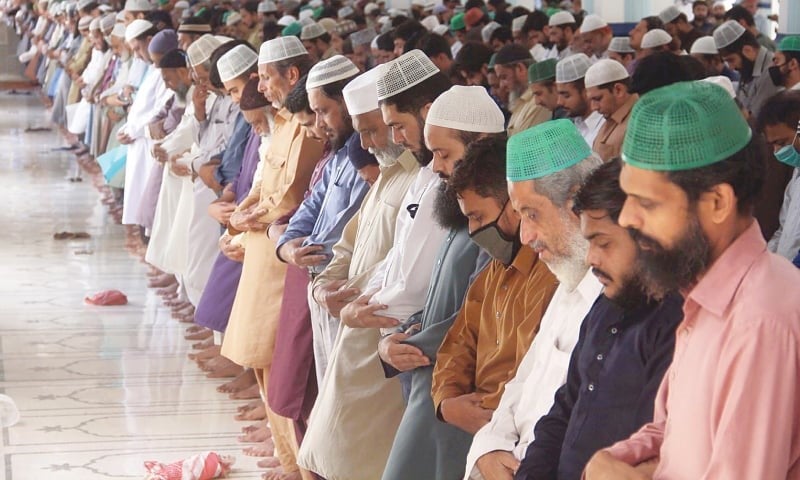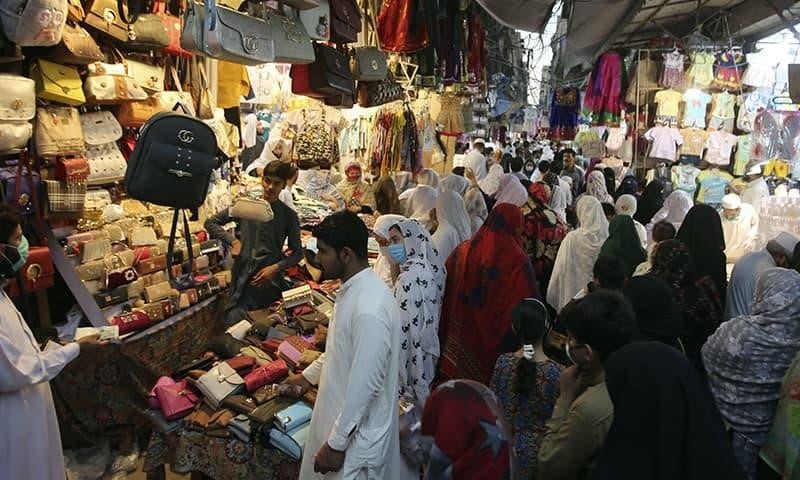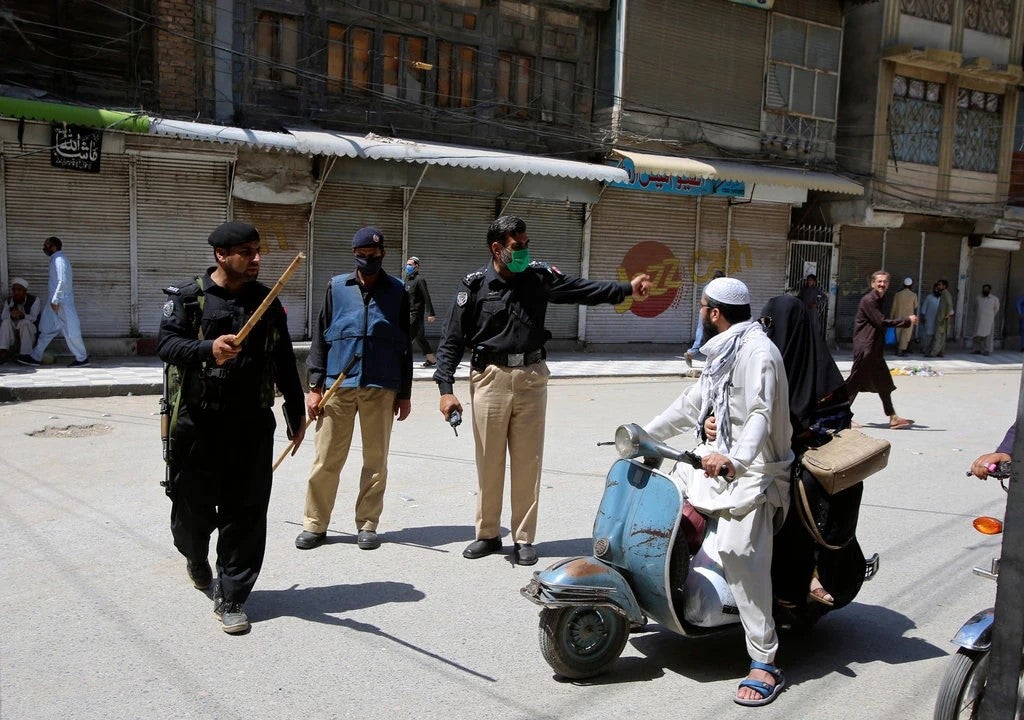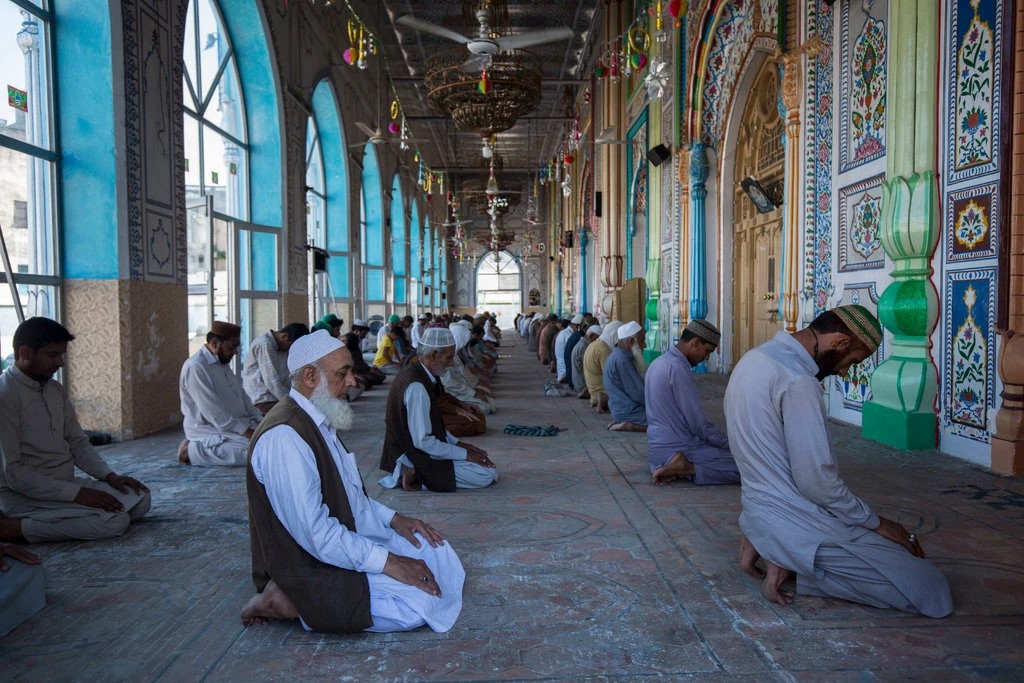Moral and religious responses to the COVID-19 pandemic in Pakistan
contributed by Philipp Zehmisch, 14 August 2020

Fig. 1. People offering Friday prayers at Memon Masjid, Karachi. Source: Online, published on Dawn
Religion, morality, and the pandemic
When the COVID-19 pandemic was rapidly spreading across the globe, Pakistan joined the global trend and declared a country-wide lockdown in mid-March. The lockdown inhibited major parts of the already struggling Pakistani economy from functioning in the typically uneven and unequal ways, driving millions of employees, workers and daily wage-earners into a struggle for survival, existential crises, depression, domestic conflict, and violence. Religion and morality play, undoubtedly, a crucial role in how Pakistanis cope with the effects and challenges of the crisis.
The intersecting religious and public realms are linked to the specific conditions which led to the creation of the Islamic Republic of Pakistan as a homeland for Muslims carved out of British India in 1947. Initially, the idea of being “Muslim” was conceived of in a rather secular fashion as a socio-political category marked by civilizational, cultural, and religious difference from Hindus. However, as Pakistani nationalism intersected with notions of Islamic modernity, the idea of Pakistan came to embody the notion of Muslim self-determination in a separate territory: a “Muslim Zion”. In the process of nation-building, a more encompassing idea of “Muslim-ness”, implying the display and policing of piety, came to be inscribed into the very notion of the public realm.
Islam in Pakistan is hence conceptualized to function as a most common denominator linking large parts of an ethnically, religious, linguistically and culturally diverse population to the master narrative of a nation-state. While this narrative is constantly contested, fragmented, subverted, and undermined due to the sheer diversity of sects and orientations encompassed within the very general notion of Islam, it surely provides a context and a religiously loaded atmosphere. This religious framing lends interpretations, often involving moralizing arguments, of the COVID-19 pandemic with a particular vigour.
When looking at ways in which Pakistanis cope with the pandemic and its effect, one is tempted to ask: how do the people evaluate the government’s enforcement of a lockdown and Standard Operating Procedures (SOPs), such as social distancing and sanitary measures, from a moral and religious perspective – taking into account that these policies inhibit their means of survival and everyday movement, obstructing them from fulfilling social and ritual obligations, as well as religious duties?
The Current Situation
On May 9, two weeks before Eid-ul-Fitr (the end of the holy fasting month Ramadan), the Government of Pakistan had decided to ease the strict lockdown and replace it with a “smart lockdown” – cordoning off areas with high numbers of infections. The demands of the business community and common citizens to enable pre-Eid consumption and give a boost to the devastated economy were met. The policy of lifting the lockdown presented itself to the public as a basic ethical question: will people starve to death or die from the coronavirus?

Fig. 2. Crowds at a market after the government relaxed the weeks-long lockdown measures that were enforced to curb the spread of the coronavirus in Peshawar. 11th May 2020. Source: AP, published on Dawn
In retrospect, the decision to ease the lockdown in Pakistan was certainly a form of experimenting with the lives of the poor. Since 9 May, the official number of infections has increased more than tenfold. Towards the end of July 2020, the continuously rising number of COVID-19 cases in Pakistan is approaching 300,000 confirmed cases and around 6,000 reported deaths. Of course, the real number of infections must presumably be much higher. Recently, a civil servant involved in pandemic related policies admitted to me that no number regarding infections, recoveries, or death rates would be accurate, as there is no systematic mechanism of thorough data tracking. Furthermore, most of the infected are not counted because they cannot afford tests or have no access to healthcare facilities.
Conspiracies, Urban Legends, and Resistance
Characteristic of the broad distrust of the state and elites in general, religion and urban legends enter into a lethal mix with various conspiracy theories, which are also circulating with regards to COVID-19 and its treatment. Spread by religious hardliners, among others, there is a popular reluctance to get tested for epidemics due to suspicion regarding hidden imperialist agendas, instituted by the so-called “enemies of Islam” with the goal to harm the global Islamic community (Ummah). Under this guise, polio workers are regularly killed because polio drops have been declared a Western conspiracy to cause infertility among Muslims. Similarly, healthcare personnel seeking to administer COVID-19 tests have been regularly attacked.
According to a dominant conspiracy narrative, going to hospitals evokes the danger of disappearance involving one’s body parts and organs being harvested and sold “abroad”. As corpses are seen as sacred and funeral prayers are viewed as absolutely essential, the discrete and isolated treatment of coronavirus patients is easily associated with malevolent powers and enemies of the state. For example, a mob attacked doctors and healthcare workers and vandalized a hospital in Karachi when doctors kept a deceased patient’s corpse– against the will of his relatives – in order to wait for the result of a COVID-19 test. Another urban legend that has been going around is one of which when people came to pray at the grave of a coronavirus victim, they apparently saw an empty grave, thus implying the bodies had disappeared. Hence, many patients do not report their illness because they fear that once in government quarantine, they will not return.

Fig. 3. Police officers enforcing shutdown restrictions in Peshawar, Pakistan. 23rd April 2020. Source: Muhammad Sajjad/ Associated Press. Published on NYT
The government, in turn, has implemented SOPs, but this unfortunately has a limited effect on most people’s behaviour. Many do not wear masks and continue to meet others, especially at significant life cycle rituals such as weddings and funerals, as well as religious gatherings, including Friday prayers. Most Pakistanis attach more value to everyday rituals and demands of etiquette, like handshakes and hugs, than an abstract danger of infection through shaking hands. Some religious scholars have insisted on holding Friday prayers against the government's request, rendering Pakistan the only Muslim country in the world which has not banned Friday prayers for some time.
In addition, interlocutors in the mountains behind Islamabad, where I have been living with my family since the lockdown, were convinced that the coronavirus would not affect those who live in the countryside, engage in manual labor and eat healthy food. Expressive of a common scepticism towards science, bolstered by piety and fatalism, one interlocutor opined that God would have already decided who will die when. As everything would happen according to God’s will, one should calm down and peacefully await one’s fate. I am tempted to ask: do they have many options other than waiting it out and continuing as before?

Fig. 4. Afternoon prayer in Rawalpindi, Pakistan, despite the advice made by doctors to urge the government to order mosques to limit attendance to five worshipers at a time. Source: Saiyna Bashir for The New York Times
The agenda of social distancing, which the government has promoted in concordance with countries across the world, can only be realized by the upper classes of the country, who can get food delivered by others and can afford enough space to isolate in a separate room when they become sick. The demands of social distancing are, however, virtually impossible for families from poorer backgrounds, as extended families often share only one or a few rooms. While the practical realities of social distancing appear difficult for most Pakistanis, they are, nonetheless familiar with the concept through narrations of epidemics embedded in the Qur’an and Hadith (collected record of the words and actions of the Holy Prophet Muhammad). A relevant example from a popular hadith is that the Prophet himself refrained from inter-city travel during periods of infectious disease. Hence, Muslims are ideally supposed to treat current travel bans as moral obligations, ultimately leading them to a more virtuous and pious life.
In turn, numerous individuals in Pakistan accept the contention that COVID-19 is a result of God's anger for the transgressions of morals. There is a widespread conviction that individual sufferings result from God's fury. One analyst marked the pandemic as a “test” for people, guaranteeing that they return to Allah in order to seek absolution for their transgressions. A reporter, considering the coronavirus an azaab (torment or discipline) from Allah, contended that these were direct results of sins committed. These sins, such as the enjoyment of sex and infidelity, imply that the sinner has wandered away from God and turned selfish.
Some orthodox religious scholars put forward that the virus was intended to target Islam and Muslims. One analyst wrote that there was a ground-breaking hostility to Islam and against Muslims on the planet. The dread of the pandemic is, accordingly, intended to close sacred places in Saudi Arabia and mosques over the world - along these lines, the lockdown functions to stop congregational prayers in mosques.
In fact, pilgrims have played a central role in the spread of the virus. Shia pilgrims returning from Iraq and Iran were among the first to bring the virus to Pakistan. According to media reports, elaborate and very crowded receptions of pilgrims returning from Mecca led to a rapid spread of COVID-19 in certain localities. Similarly, the Tablighi Jamaat, a reformist and missionary Islamic movement, has instructed people to turn a blind eye to lockdown orders prohibiting religious or other public gatherings. Tablighi preachers attribute “modern practices” that stray from traditional Islamic virtues to the emergence of COVID-19 itself. They put forward that only God can fix such problems and therefore, the best alternative for individuals seeking respite from the deadly virus should be to repent their sins and seek to retain their moral values.

Fig. 5. The five-day tableeghi ijtima takes place at Raiwind Tableeghi Markaz. 10th March 2020. Source: AP/File. Published on Dawn
Disregarding the general orders of the lockdown, the organization assembled up to 250,000 Tablighis on March 10, 2020 for a congregational prayer at the headquarters of the Jamaat in Raiwind near Lahore in the Punjab. As a result, hundreds of people were affected by the virus - for which they presumably proceeded to spread it all over Pakistan when returning to their homes. From more than 10,000 participants at the gathering who were tested, 539 have tested positive for COVID-19. Of these positive cases, 404 were reported to have contracted the virus in Raiwind. Health authorities have confirmed that the rise of cases in Punjab can be directly attributed to this congregation.
To conclude, Pakistanis face a variety of contested information in their everyday lives, disseminated both by state and religious actors. While there is formally a private domain of citizens, addressed by government demands for individual discipline and responsibility, these globally applied prescriptions have proven ineffective in containing the spread of the pandemic in Pakistan. Here, religion and public morality have come full circle at the expense of people’s distrust in science, the body politic, the state, its health system, and its capability of dealing with the pandemic. Pakistanis, especially those who do not belong to the elite, encounter myriads of alternative - most often religiously charged - world-views and explanations that help them cope with the disastrous impacts of COVID-19 on their everyday lives. The void created by the state’s long-standing neglect of public welfare, especially when it comes to recent neoliberal reforms of the health system involving significant budget cuts, seems to be filled with meaning by forces who follow their own logics, arguments, and reasonings.
Disclaimer: The views and opinions expressed in this article are those of the authors and do not necessarily reflect the position of the blog editorial team or the Asia Research Institute.
South Asia | Southeast Asia | East Asia | Other Places | Hinduism | Buddhism | Islam | Christianity | Other Religions
Philipp Zehmisch is a social and cultural anthropologist working at the South Asia Institute, Heidelberg University. Philipp observed the unfolding of the COVID-19 in Pakistan while teaching anthropology at the Lahore University of Management Sciences. His contribution is based on observations, conversations, media reports and online classes with undergraduate students.

